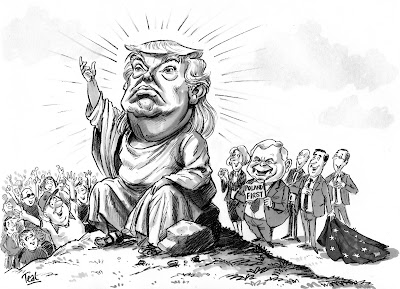- Get link
- X
- Other Apps
- Get link
- X
- Other Apps
I’m currently reading the book “Influence: The Psychology of Persuasion” by Robert Cialdini. There is a chapter where he tells the story of a religious cult. The cult believed, like many do, that on a certain date the world would end but they would be saved. In this example the cult thought there was going to be a flood, but before the flood a spaceship was going to arrive and pick them up. The cult members sold their belongings and quit their jobs. They got together at the appointed time and as you can expect, nothing happened. From the outside, reading this, we might think at this point they realized the error of their ways. But what is at stake here is that they committed to something and can’t go back and say they were wrong. Instead, they went further into the rabbit hole, coming up with the justification that since they were so devout in their beliefs that God decided not to destroy the world. They had to make up a new truth.
 |
| Image Source |
This to me sounds exactly like #Cult45 or Trumpers. Leading up to the election, the messiah was preaching that there was no way he could lose. The Democrats put up the worst candidate, and he was so great at his job that the only way he could lose was if the election were to be rigged. The followers bought into this. Going on Twitter and other social media groups, the cult members were posting how glad they were going to be when he won and how the only way he could lose was due to a rigged election. Well, as we all know by now, he did lose. Yet, already committed to the belief that they couldn’t be wrong, they doubled down on the idea that the only way he lost was because of a rigged election. While anyone from the outside can see that it was not rigged. And the winner won because he got more actual legitimate votes.
As people, our commitment to something and inability to admit we are wrong is so ingrained into our psyche that even though it is clear, we were wrong about something; we convince ourselves otherwise, completely disregarding the facts and realities staring us in the face.
So, how does this knowledge help us when debating a true believer? I don’t know. I haven’t finished the book. I just think it is an interesting parody that in the face of an obvious truth people will still convince themselves that the lie they told themselves is in fact the actual truth, rather than admit to being wrong.
- Get link
- X
- Other Apps
Comments